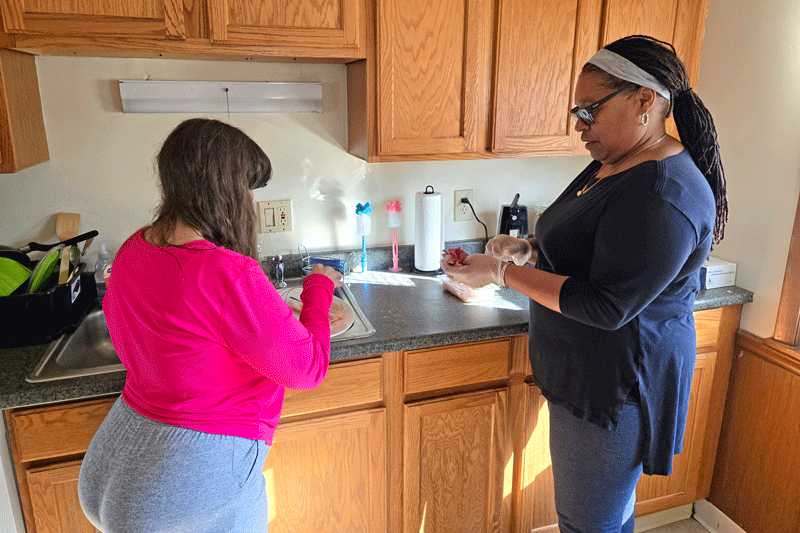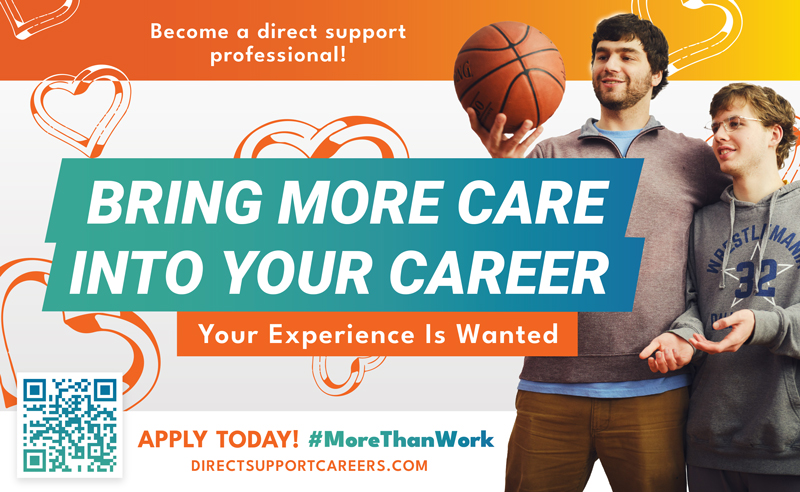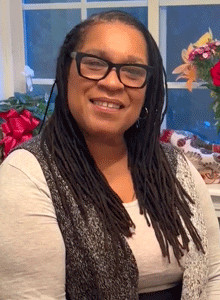Living Resources, a Capital Region agency where I proudly work, serves about 1900 people with autism or other disabilities and life-challenging conditions. As I pen this piece during the holiday season, I am reminded of one of the most rewarding and instructive moments I experienced at one of the agency homes I manage.

Living Resources Residential Manager Michelle Bynoe in a kitchen with a person she supports
The moment provided a lesson about the power of communication. But here’s the thing: not a word was spoken.
This is what happened: A few years back, during Christmas, residents and staff together decorated our home’s living room. It was transformed into a winter wonderland, with lights and ornaments on the tree, garlands across the walls, and other holiday decor placed all around. Everything was just so beautiful, warm, and comforting.
One subsequent evening, I sat on the living room sofa admiring our handiwork when a resident made herself comfortable, laying down in front of me on the rug with pillows all around her.
We were both sharing a cherished moment, appreciating the glow of the room and the magic of Christmas, family and community all wrapped in one. It was a gift, and neither of us wanted to be in another place.
In our silence, we communicated everything.
Thinking back, that moment summed up the wonder and power of communication: it often isn’t spoken. It is almost always much more than words.
Still, the wonder and power of communication is not without its challenges. In working with people with autism, that communication always needs to be “heard.”
There is a myriad of ways we all communicate through both verbal and non-verbal means — and that’s especially true of autistic people. So, being on the other end of a verbal or non-verbal cue and “listening” to understand what is being communicated is fundamental to my job.
How people with autism communicate can differ immensely. For one thing, like all of us, some people with autism are extroverts, and some are introverts. For extroverts who may have little difficulty verbalizing, we must listen intently. For the less verbal introverts, we need to actively observe and be even more studious about picking up on non-verbal cues.
By the way, there is a horrible misconception that those who don’t verbalize do not understand what you are saying or requesting. There is a huge difference between speaking and understanding. Many people who don’t verbalize understand you just fine. They just can’t verbalize their thoughts adequately.
Another thing to keep in mind with communication with autistic people is that there is frequently a delay in processing. It is imperative to be patient and allow them to think and answer. If their social skills are delayed, you might think they are not listening or ignoring you, but they do hear you, and they will respond when they are ready and able.
Finally, it is crucially important to be open to people to give them the confidence they need to express themselves. If people don’t trust you, if they don’t feel comfortable bringing their thoughts to you, or feel they will not be heard, they will not attempt to communicate.
More Than Listening
When it comes to communicating with autistic people, nothing is more important than active listening and observing.
Still, it is just half the work.
How we communicate in response is the rest. Together, the two are the magic behind growth and independence.
But just like how differently people with autism communicate to us, how best to communicate back can vary immensely by person.
For example, a person in one of the houses I manage preferred to communicate with a certain staff member over another who had much more experience. We realized that the staff members had different communication styles, and the person preferred one style to another.
It really comes down to knowing the needs of the person and communicating and supporting each person in the way they respond best.
Communication tactics also need to be properly tailored to how each person listens and observes. Often, our communications need to be repeated in numerous ways for specific learnings to be understood and consistently used by someone. But, once learning is achieved, nothing is more rewarding.
When I have the privilege of witnessing such an accomplishment, I don’t have to say a thing. The smile on my face silently says it all.
More Than We Know
So far, I have spoken about the power of communication in working with the people we serve, but the importance of communication in this field extends beyond that. It also extends to constant communication with our colleagues and peers so we can learn from one another.
When we professionals learn more than we already know, we are all better equipped to support the people we care for. For them to flourish and grow, so must we.
I am happy to report that such communication has been steadily increasing in recent years. I have been especially grateful for the increased focus on the professional development of direct service professionals (DSPs) like me.
More than ever, there are expanded offerings for training, micro-credentialing, and opportunities to network with our colleagues and share our experiences. That is already translating into better support for the populations we serve.
#MoreThanWork
The final piece of communication in our field is talking to people outside our profession who would be a great fit joining us in working with people with autism and other developmental disabilities. We need more of these people who are driven to help others, as there is a serious shortage of professionals in our field.
Earlier this year, a promising New York-based campaign called #MoreThanWork was launched to communicate with people working in other professions or who are ready to join the direct support workforce.
This recruitment campaign, which reaches out to people of every age and background, highlights the essential role DSPs play in helping others while promoting how rewarding and enriching a DSP career can be.
The #MoreThanWork campaign is already bringing new people into our profession, developing future leaders in our field, and, most importantly, improving the lives of the people we serve.
More Than Ready
I enter this new year full of hope and great expectation, with the tools of communication in my back pocket and the love of my residents squarely in my heart.
For the challenges and opportunities ahead, I am more than ready. This job means more to me than words can say.
Michelle Bynoe is Residential Manager at Living Resources. The agency’s core purpose is to support and empower individuals with disabilities or other life-challenging conditions to live with dignity, independence, and happiness. Living Resources’ services are individualized and offered in a variety of settings, from 60+ residential housing arrangements, site-based services, college programs, day opportunities, arts, community volunteering, supported employment, afterschool programs, and counseling services. Learn more about the agency at www.livingresources.org.





